

The idea that the learning process needs some sort of play in it have been alive since the old Greeks where sports and other more playful activates where added to the more strict read processes. And all great scholars such as Plato and Socrates argued for learning by playing is a big part if the learning process. Moving forward to the 21th century I will with this article explore if and if so, how a modern version of the old play, namely videogames, play a part in today’s education. Since videogames is a huge field I will narrow down the focus to MMOs which is less huge, and adds a higher social aspect which make them even more unique in a learning process.
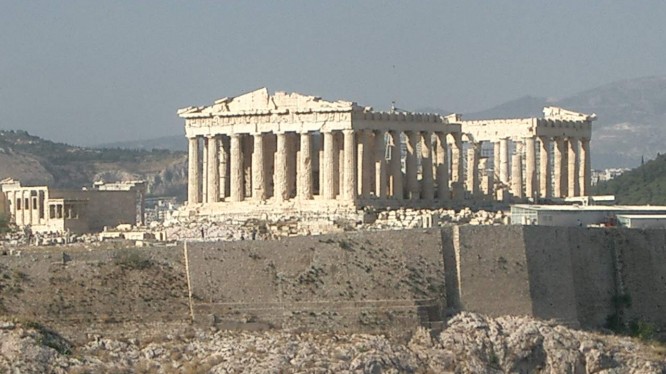
The old Greeks knew how to build and how to play.
Before digging deeper in what MMOs can and has brought to the education process, it deserves mentioning that while the use of MMOs in education is relatively new, the use of videogames and how they can help us learn has been studied since the eighties. While the games used back then where games such as Pacman, and only used in quick decision making at universities, studies in the late nineties have used games such as the Civilization franchise to help dropout students back into school with an A in history and the Simcity franchise to teach about city planning and infrastructure. While these games are very limited in what they can teach us and are heavily niched into one area, MMOs are something different, something more, and I will with the current research show you how.
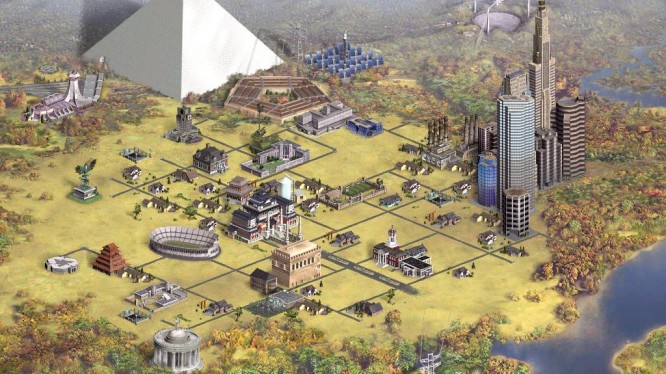
Civilization 3 helps dropout students.
What is it then which makes MMOs so different and unique in these cases? Well mostly it is about the social aspects found in MMOs and how they are built around working together towards a common goal where everyone can benefit. This is something Ekman explores in his article on how players socially engage in MMOs and what effects they could have in school work. By using World of Warcraft he finds that there is a highly cooperative factor in the game which encourages players to learn more about how to proceed, but he does not find and spillover effects in the real life.
In another study made by Squrie, he brings games such as Civilization into the history classroom to see how learning history can be enhanced by a computer game. He finds that people already grading high does about the same as before, but the students whom are struggling with school the game really helps as they learn from the game and is encourage to dig deeper into history outside the game. If it also was possible for a game to include the same amount of information and encouragement as Civilization manages to do in Squires study with the social aspects in an MMO, this could open up for an even greater educational outcome, where Ladwig with others show how the interactive and social structure of the internet creates a better understanding for the topic which the user is concerned about.
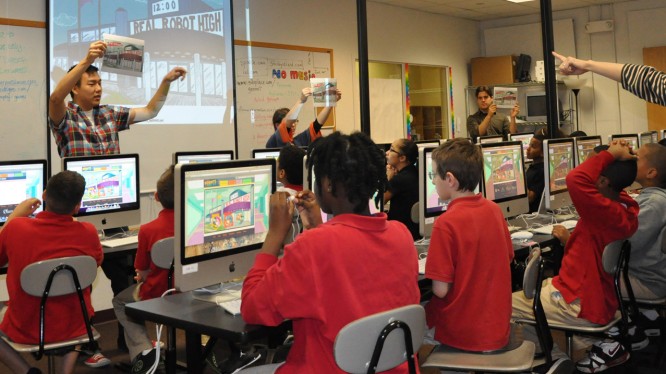
Games are being used in education.
Following the idea of how social interaction online can enhance learning; Bourgonjon and Soetaert explore the social spaces created within video games and especially MMOs. They find that online games create new and unique social spaces not found anywhere else. Both in the game where communities are built around guilds where its members in most cases are helpful to each other both within the game and by creating an environment where they can talk about everything,. But the social space created is not only within the game but also in different internet forums where the players can engage with other liked minded talking about the game in general and about specifics when not playing. These social spaces open up for a new way of learning with could enhance learning in schools, but while games should be taken serious they also argue for not confusing potential with actual practice.

A map over the scocial spaces and threads on the internet.
This leads to the question if the classroom is ready for videogames in general and MMOs in specifics and how they could be implemented. Annette explore both of these areas in here article on games and education, where she shows how educational games generate a positive emotional engagement not found anywhere else within the educational process. She argues that one of the most important things needed for games to succeed is a strong social presence which we can find in all MMO games. She concludes that games are being used to some extent, but mostly serious educational games made for this purpose, and this needs to evolve and include more commercial games, especially games with a strong social structure, as MMOs have. She argues that this will lead to a better and more efficient education for today’s youth, and even something which will lower costs in schools and the weight of the children’s not so ergonomically made backpacks.
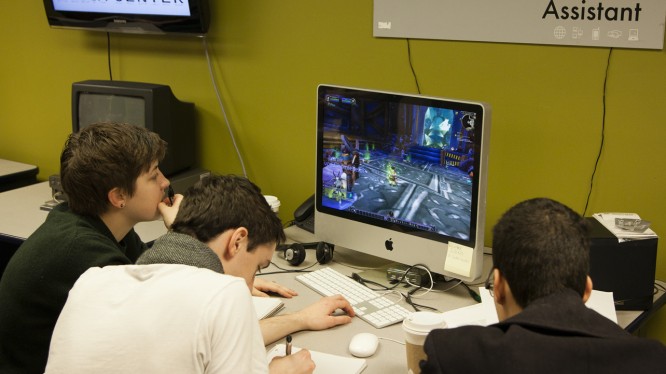
Is studying with World of Warcraft the future?
How MMOs should be translated into the classroom is something Curry looks into where she argues for how different features of MMOs can be directly implemented in the classroom, both to engage the students in a way that most of them are familiar with and that would encourage working together and by getting people to work together. She talks about how the teacher could help the students to form “guilds” in the beginning of the year consisting of students exceling in different areas, where each guild are tasked with “quests” which they must solve together. And these “quests” could be any task in school really with a new name and using the multipart structure most quest use in an MMO, the teacher can encourage the students to finishing the present task in order to get a new one leading up to the final harder one.
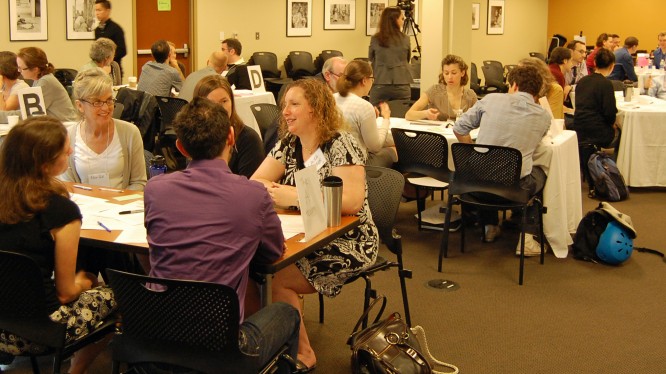
LFG?
While video games and MMOs are starting to take root in some classrooms, often in the form of custom created games for educational purposes, they are still in an early stage in the schools where they are being used. But recent research shows that video games and especially MMOs can play an important part in today’s education and should be implemented as soon as possible. By using MMOs and the structure of MMOs in education, the teachers can meet its students in an area where the students are comfortable and with tools both easy to use and easy to come by in the school. But we should not see this as a solution to all problems in school and MMOs should not be overused, they can still create more harm than anything else if used in the wrong way. While we should embrace a future where MMOs is being used in schools, we should tread carefully into this new but promising territory.
Research used in the article:
Annetta, Leonard A. (2008) Video Games in Education: Why they Should be Used and How They are Being Used.
Bourgonjon, Jeroen & Soetaert, Ronald (2013) Video Games and Citizenship.
Curry, Kristal. (2010) Warcraft and Civic Education: MMORPGs as Participatory Cultures and How Teachers Can Use Them to Improve Civic Education.
Ekman, Joakim. (2013) Schools, Democratic Socialization and Political Participation: Political Activity and Passivity among Swedish Youths.
Squire, Kurt. (2005) Channing the Game: What Happens When Video Games Enter the Classroom?
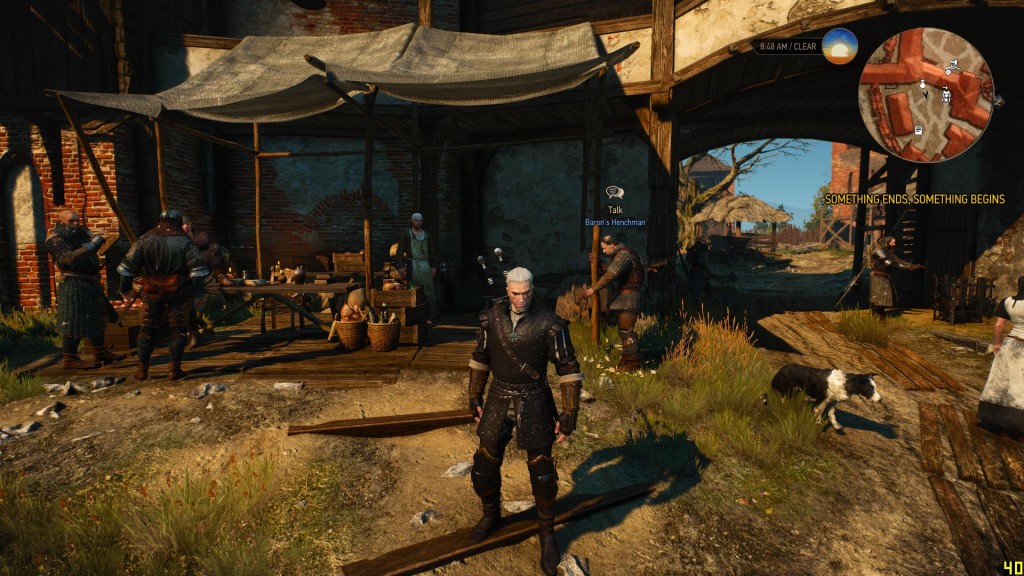


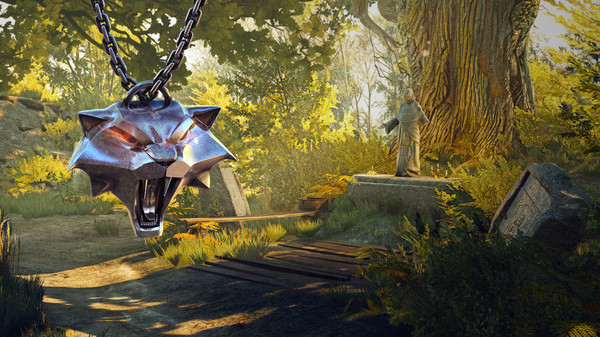
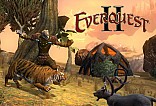 EverQuest 2: Following the Golden Path
EverQuest 2: Following the Golden Path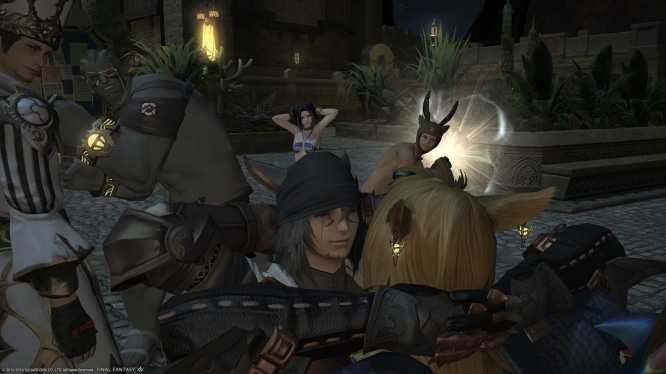 Are Guilds Still Relevant? .
Are Guilds Still Relevant? . World Cyber Arena: Where eSports Meets Mobile .
World Cyber Arena: Where eSports Meets Mobile .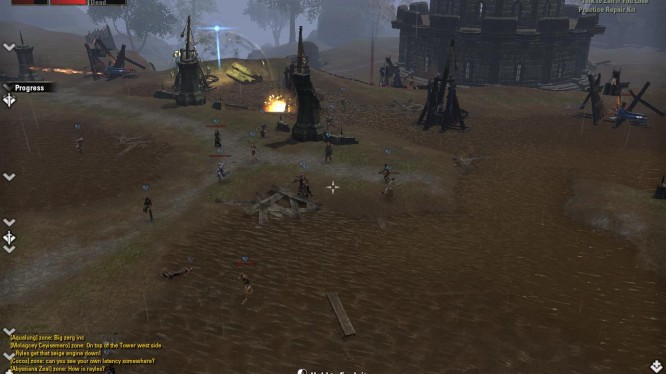 The Rule of War: Elder Scrolls Online .
The Rule of War: Elder Scrolls Online .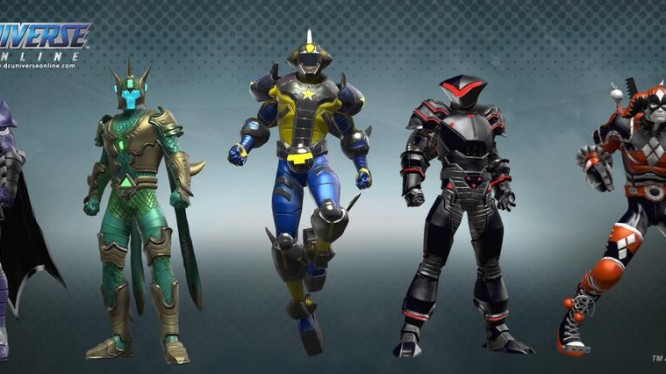 DC Universe Online: Bizzaros, Bats and Doing the Time Warp - MMOGames
DC Universe Online: Bizzaros, Bats and Doing the Time Warp - MMOGames